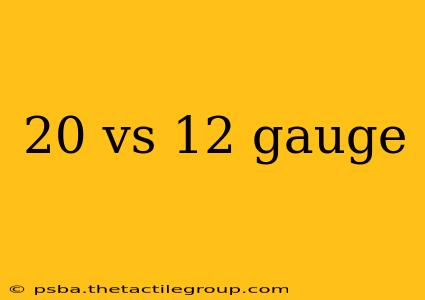Choosing between a 20-gauge and a 12-gauge shotgun is a common dilemma for both seasoned hunters and new shooters. The decision hinges on several factors, and understanding the key differences is crucial to selecting the firearm that best suits your needs and physical capabilities. This comprehensive guide will delve into the specifics of each gauge, helping you make an informed choice.
Gauge Explained: What Does it Mean?
Before we compare the two gauges, it's important to understand what "gauge" signifies. Gauge refers to the diameter of the shotgun barrel. A lower gauge number indicates a larger diameter barrel, meaning it can fire larger shells. Therefore, a 12-gauge shotgun has a larger bore than a 20-gauge.
12 Gauge: The Workhorse
The 12-gauge is the most popular shotgun gauge worldwide. Its popularity stems from its versatility and power.
Advantages of 12 Gauge:
- Power and Range: The larger bore allows for the use of heavier shot loads, resulting in greater range and stopping power. This makes it ideal for hunting larger game like deer or waterfowl at longer distances.
- Wide Availability: Ammunition for 12-gauge shotguns is readily available and relatively inexpensive compared to other gauges.
- Variety of Loads: You'll find a vast array of ammunition types, from light target loads to powerful magnum loads, catering to various hunting and shooting disciplines.
Disadvantages of 12 Gauge:
- Recoil: The significant recoil can be challenging for new shooters or those with less upper body strength. This can lead to fatigue and discomfort, especially during extended shooting sessions.
- Weight and Size: 12-gauge shotguns tend to be heavier and larger than their 20-gauge counterparts, making them less maneuverable in tight spaces or for all-day hunts.
20 Gauge: The Lightweight Champion
The 20-gauge is a popular choice for hunters and shooters who prioritize lighter weight and reduced recoil.
Advantages of 20 Gauge:
- Reduced Recoil: The smaller bore and lighter weight result in significantly less recoil, making it more comfortable for extended shooting sessions and ideal for beginners.
- Lighter Weight: This improved maneuverability makes it easier to handle in various shooting situations.
- Still Effective: While less powerful than a 12-gauge, modern 20-gauge ammunition provides sufficient stopping power for many hunting applications, including upland birds, doves, and even smaller deer with appropriate shot selection.
Disadvantages of 20 Gauge:
- Less Power: The reduced power compared to a 12-gauge may limit its effectiveness at longer ranges or when hunting larger game.
- Ammunition Cost: While readily available, 20-gauge ammunition can sometimes be slightly more expensive per round than 12-gauge.
- Limited Load Selection: Though improving, the variety of loads available might be slightly less extensive than for 12-gauge shotguns.
Which Gauge is Right for You?
The best choice depends on your individual needs and preferences:
- New Shooters or Smaller Individuals: The 20-gauge is generally recommended due to its reduced recoil and lighter weight.
- Hunting Larger Game at Longer Ranges: The 12-gauge offers superior power and range.
- Upland Bird Hunting or Smaller Game: Both gauges are suitable, but the 20-gauge's lighter weight might be advantageous.
- Target Shooting: Both gauges are used effectively, with personal preference often dictating the choice.
Ultimately, consider handling both gauges before making a decision. Rentals are often available at shooting ranges, allowing you to experience the recoil and handling characteristics firsthand. Talking to experienced shooters and hunting guides can also provide valuable insights to guide your choice. Choosing the right shotgun will ensure a safer, more enjoyable, and more effective shooting experience.

